Black History: Virginia Wasn't Always for Lovers
While on assignment for Life magazine in 1965, photographer Grey Villet, who created some of the most poignant photo essays in his 17-year tenure with the publication, traveled to Virginia to photograph convicted felons Richard Loving and his wife, Mildred.
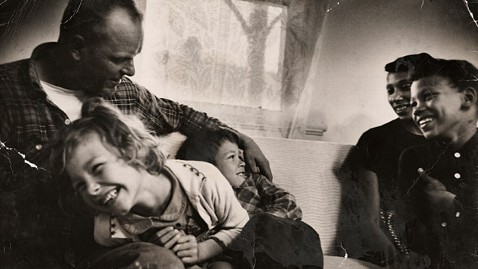
Richard and Mildred Loving with children Peggy, Donald and Sidney in their living room, King and Queen County, Va., April 1965 (© Estate of Grey Villet)
Richard, a white man, and Mildred, of African-American and Native-American descent, were guilty of violating the state's anti-miscegenation law, the Virginia Racial Integrity Act of 1924.
The Lovings were married in 1958 in Washington D.C., but were arrested upon return to their home state. The Lovings pleaded guilty to the felony Jan. 6, 1958, and Judge Leon M. Bazile sentenced them to a year in prison, which would be suspended if the Lovings agreed to leave Virginia and not return for 25 years. Banished, the Lovings moved to Washington D.C., but yearned to go back to their beloved families and rural Virginia home.
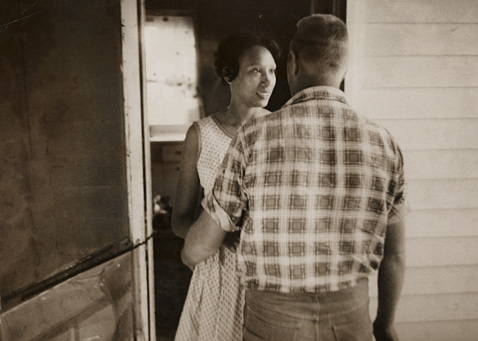
Mildred Loving greeting husband Richard on their front porch, King and Queen County, Va., April 1965 (© Estate of Grey Villet)
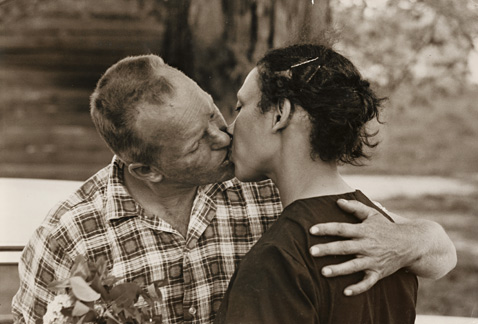
Richard Loving kissing wife Mildred as he arrives home from work, King and Queen County, Va., April 1965 (© Estate of Grey Villet)
On appeal, Bazile refused to set aside his original verdict, stating, "Almighty God created the races white, black, yellow, Malay and red, and he placed them on separate continents. And but for the interference with his arrangement there would be no cause for such marriages. The fact that he separated the races shows that he did not intend for the races to mix."

Peggy, Sidney and Donald Loving playing King and Queen County, Va., April 1965 (© Estate of Grey Villet)
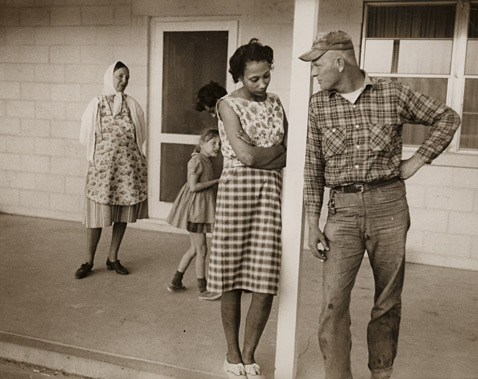
Mildred and Richard Loving, their daughter Peggy, Mildred's sister, Garnet, and Richard's mother, Lola, on the front porch of Mildred's mother's house, Caroline County, Va., April 1965 (© Estate of Grey Villet)
Although the Lovings were not active participants in the civil rights movement, their tenacious fight to live as husband and wife in their home state eventually led to the Supreme Court's 1967 ruling that unanimously declared Virginia's anti-miscegenation law, and all raced-based marriage bans, unconstitutional.
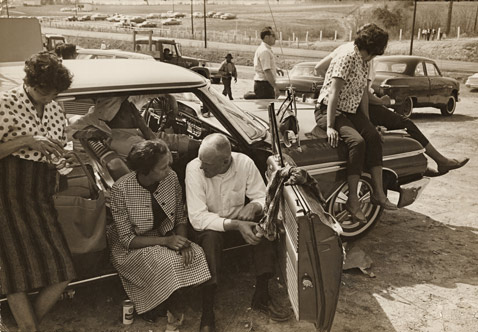
Richard and Mildred Loving celebrating Richard's winning race, Sumerduck dragway, Sumerduck, Va., April 1965 (© Estate of Grey Villet)
South African-born Villet, whose photos of the Lovings are on exhibit at New York's International Center of Photography through May 6, was sympathetic to those suffering under unjust laws and captured intimate moments in Richard and Mildred's lives, as well as their three children. They make up a complex view of two publicity-shy and nonpolitical people whose landmark case changed the law not only in Virginia, but in 15 other states that prohibited interracial marriage.